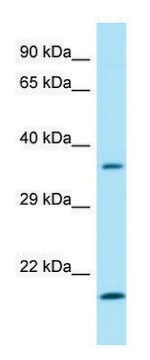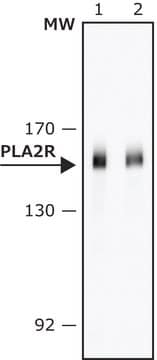MAB8292
Anti-Parvovirus B19 Antibody, clone 521-5D
clone 521-5D, Chemicon®, from mouse
Sign Into View Organizational & Contract Pricing
All Photos(1)
About This Item
UNSPSC Code:
12352203
eCl@ss:
32160702
NACRES:
NA.41
clone:
521-5D, monoclonal
application:
ELISA
ICC
IHC (p)
ICC
IHC (p)
species reactivity:
human
technique(s):
ELISA: suitable
immunocytochemistry: suitable
immunohistochemistry (formalin-fixed, paraffin-embedded sections): suitable
immunocytochemistry: suitable
immunohistochemistry (formalin-fixed, paraffin-embedded sections): suitable
citations:
14
Recommended Products
biological source
mouse
Quality Level
antibody form
purified immunoglobulin
clone
521-5D, monoclonal
species reactivity
human
manufacturer/tradename
Chemicon®
technique(s)
ELISA: suitable
immunocytochemistry: suitable
immunohistochemistry (formalin-fixed, paraffin-embedded sections): suitable
isotype
IgG
shipped in
wet ice
Specificity
Human parvovirus B19. Recognizes amino acids 446-466 of VP2. Antibody inhibits haemagglutination.
Immunogen
B-19 virus purified from an acute serum specimen from a child with aplastic crisis (Anderson, 1986).
Application
Immunoassay.
Immunocytochemistry
Optimal working dilutions must be determined by end user.
Immunocytochemistry
Optimal working dilutions must be determined by end user.
Research Category
Infectious Diseases
Infectious Diseases
Research Sub Category
Infectious Diseases - Viral
Infectious Diseases - Viral
This Anti-Parvovirus B19 Antibody, clone 521-5D is validated for use in ELISA, IC, IH, IH(P) for the detection of Parvovirus B19.
Physical form
Format: Purified
Purified immunoglobulin. In 0.02M PB and 0.25M NaCl pH=7.6 with 0.1% NaN3 as a preservative.
Storage and Stability
Maintain at 2-8°C in undiluted aliquots for up to 12 months
Other Notes
Concentration: Please refer to the Certificate of Analysis for the lot-specific concentration.
Legal Information
CHEMICON is a registered trademark of Merck KGaA, Darmstadt, Germany
Disclaimer
Unless otherwise stated in our catalog or other company documentation accompanying the product(s), our products are intended for research use only and are not to be used for any other purpose, which includes but is not limited to, unauthorized commercial uses, in vitro diagnostic uses, ex vivo or in vivo therapeutic uses or any type of consumption or application to humans or animals.
Storage Class Code
10 - Combustible liquids
WGK
WGK 2
Flash Point(F)
Not applicable
Flash Point(C)
Not applicable
Certificates of Analysis (COA)
Search for Certificates of Analysis (COA) by entering the products Lot/Batch Number. Lot and Batch Numbers can be found on a product’s label following the words ‘Lot’ or ‘Batch’.
Already Own This Product?
Find documentation for the products that you have recently purchased in the Document Library.
Peng Xu et al.
Antimicrobial agents and chemotherapy, 63(3) (2018-12-12)
Human parvovirus B19 (B19V), a member of the genus Erythroparvovirus of the family Parvoviridae, is a small nonenveloped virus that has a single-stranded DNA (ssDNA) genome of 5.6 kb with two inverted terminal repeats (ITRs). B19V infection often results in
Laura A Adamson et al.
Journal of medical virology, 86(9), 1614-1620 (2013-11-23)
Human erythrovirus B19 (EVB19) is a small, pathogenic DNA virus that has been associated with a wide range of illnesses. The primary site of replication is in bone marrow-derived erythroid progenitor cells, but EVB19 DNA has been detected in a
Placental cellular immune response in women infected with human parvovirus B19 during pregnancy.
Jordan, JA; Huff, D; DeLoia, JA
Clinical and Diagnostic Laboratory Immunology null
Human parvovirus B19 infection in acute fulminant liver failure.
Y V Karetnyi, P R Beck, R S Markin, A N Langnas, S J Naides
Archives of Virology null
L Skjöldebrand-Sparre et al.
BJOG : an international journal of obstetrics and gynaecology, 107(4), 476-480 (2000-04-12)
To identify the presence of parvovirus B19 infection as a possible cause of fetal loss in the third trimester. Prospective study of women experiencing third-trimester intrauterine fetal death (IUFD). All cases of IUFD at Danderyd Hospital from 1992 to 1998.
Our team of scientists has experience in all areas of research including Life Science, Material Science, Chemical Synthesis, Chromatography, Analytical and many others.
Contact Technical Service







